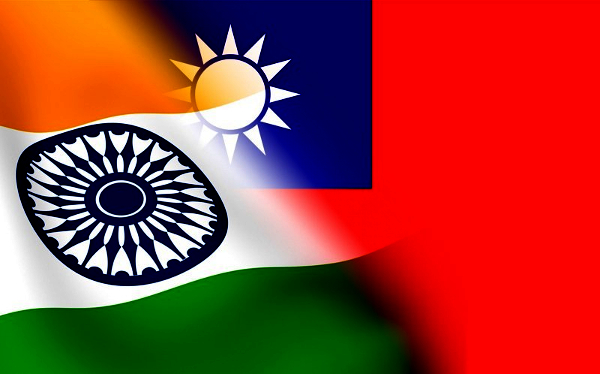In 2014-15, both India and Taiwan elected new leaders, projected as harbingers of change, to overhaul their respective economies and international standing. With China challenging India’s position in South Asia and the Indian Ocean, New Delhi has altered its “Look East” policy to “Act East” policy to counter China’s influence.
Concurrently, to shed its dependence on China, Taiwan formulated the “New Southbound Policy” focusing on Southeast Asia and India for partnerships. This infused a new vibrancy in India-Taiwan relations and invited strong reactions from Beijing.
India and Taiwan have steadily strengthened their economic ties by signing a number of economic MoUs and agreements since 2016. The Narendra Modi Cabinet recently approved a Bilateral Investment Agreement between India and Taiwan.
Bilateral trade between India and Taiwan has grown nearly six-fold, from US$1.19 billion in 2001 to US$6.4 billion in 2017. India ranks as Taiwan’s 14th largest export destination and 18th largest source of imports. By the end of 2017, Taiwanese companies invested US$1.5 billion in India.
Cultural exchanges between the two countries accompany these economic strides. In both 2017 and 2018, a delegation of Taiwanese college students, led by senior diplomats, visited India under the MFA’s International Youth Ambassador Exchange Program to promote Taiwanese culture and people-to-people exchanges.
Sixty-six Indian students were awarded scholarships by the Taiwanese government this year, a fivefold increase from 2016.
The year 2018 also witnessed some high-level exchanges between the two countries, involving delegates from the governments and economic institutions. A Taiwanese parliamentary delegation visited India to celebrate the 1st Anniversary of India-Taiwan Parliamentary Friendship Forum in 2017.
Ironically, this visit made it to the headlines due to China’s strong opposition towards it.
China, miffed with Taiwan over its pursuit of an independent course, has discouraged its international allies in Africa, Southeast Asia, and South America to have diplomatic and economic ties with Taiwan. China is making major efforts to isolate Taiwan internationally and force it to seek China’s assistance.
It is important to contextualize the recent obstacle in Indo-Taiwan relations within these international developments. Recently, Air India listed Taiwan as “Chinese Taipei” after China asked foreign airlines to list Taiwan as a part of China on their websites.
When Taiwan protested, the Indian Ministry of External Affairs stated that it had been following the “one China” policy since 1949, emphasizing this was not new. Since the Wuhan summit, India is giving concessions to the Chinese government; however, the Indian government must realize that China has proven time and again that it does not respect Indian sensitivities.
After the terrorist attack at Pulwama in Jammu and Kashmir, in which 40 Indian security personnel were killed, China condemned this terrorist attack and the Chinese Ambassador Luo Zhaohui even observed a minute of silence in their memory. The attack was claimed by the Jaish-e-Mohammed (JeM) terrorist group, which operates in Pakistan with impunity.
However, China blocked the UN Security Council committee from declaring JeM leader, Masood Azhar, as a global terrorist. China has also invested heavily in Pakistan Occupied Kashmir under the China Pakistan Economic Corridor, ending China’s ambiguity on the Kashmir issue.
On the contrary, China depicts large portions of Indian territory as Chinese and continues to coerce international organizations from providing financial assistance to projects in these areas. Additionally, China tried to impinge on India’s strategic space by its actions in Maldives proving that China is ready to trample of Indian security interests.
China has also repeatedly blocked India’s membership in the Nuclear Suppliers Group (NSG). Given this scenario, India needs to realize the intentions of the Chinese leadership. And Taiwan can prove to be a significant asset to India’s international strategy.
Taiwan has approached the US, Japan, India, and South Korea for a partnership in their Indo-Pacific strategy. Taiwan controls key islands in the South China Sea to command its northeast exit, and allow it accurate situational awareness of the surrounding areas.
This makes Taiwan an important ally for not only furthering the Indo-Pacific strategy but also for monitoring China’s expansion in East Asia.
With China unilaterally breaking the 2012 agreement with India and Bhutan regarding road construction in Doklam, Tsai Ing-wen’s words resonate, “… Taiwan today, … who’s next? Any country …[that] no longer wants to submit to the will of China, … would face similar military threats.” India should engage with Taiwan with their common core values of democracy and liberal economy as a guiding light, to strengthen their relationship further.
Source:TaiwanNews
Image Courtesy:
You may also like
-
IAF Aircraft Set Course For Exercise Eastern Bridge VII At Oman
-
India-us Working Together In Areas Like Critical Minerals, Supply Chains And Advanced Technologies: Shri Piyush Goyal
-
Defence Secretary to co-chair 5th India-Philippines Joint Defence Cooperation Committee meeting in Manila
-
2nd India-Japan Finance Dialogue held in Tokyo on 6th September, 2024
-
Prime Minister, Shri Narendra Modi welcomes Crown Prince of Abu Dhabi
